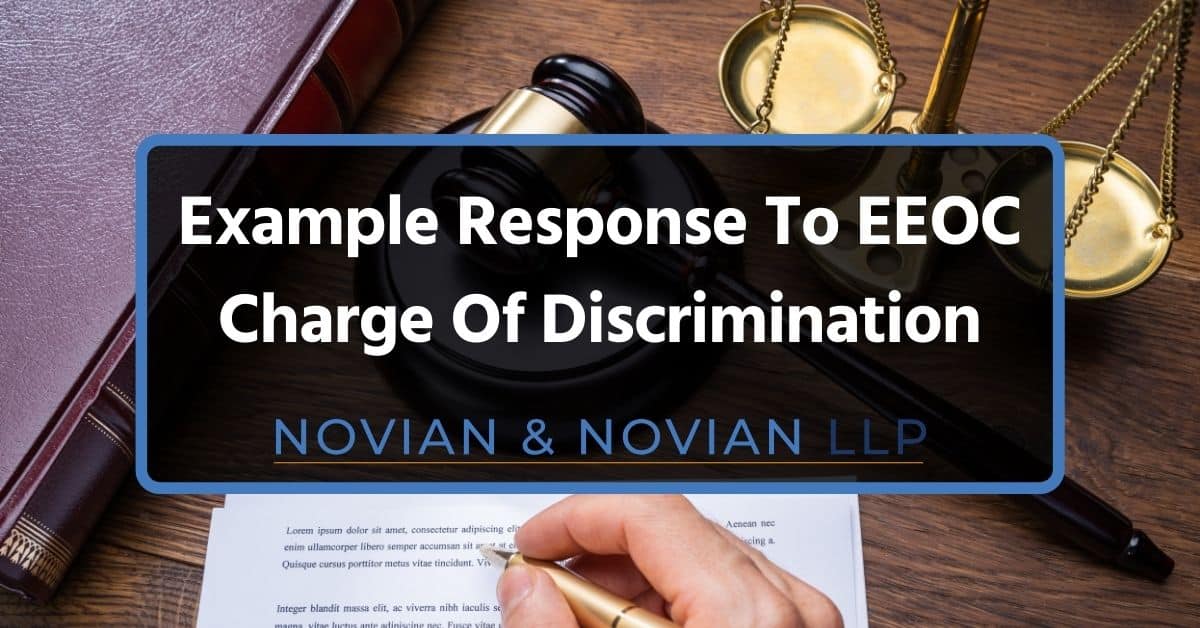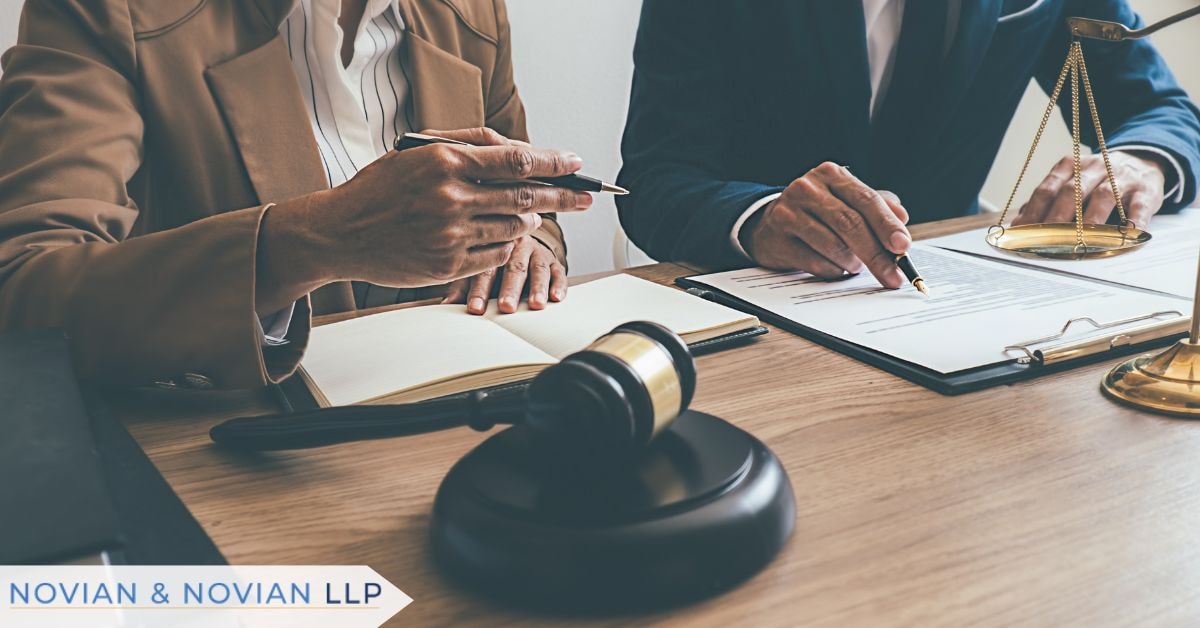
Disclaimer: This blog provides general information about the Equal Employment Opportunity Commission (EEOC) and how the body’s authority applies to employees and employers. For more information about the commission’s purpose and jurisdiction, consult with legal experts like Novian & Novian to ensure that your company complies with the EEOC’s regulations and laws.
The EEOC is a federal agency that enforces federal laws that stand to protect employees or job applicants against discrimination based on their religion, race, age, national origin, genetic information, disability, or sex (such as sexual orientation, gender identity, and even pregnancy and pertaining conditions).
When an employer receives a charge of discrimination from the Equal Employment Opportunity Commission (EEOC), they typically have 30 days to respond. This time frame can vary depending on the specifics of the charge and the EEOC’s current backlog. The response to an EEOC charge is known as a “Position Statement,” where the employer is allowed to present its version of the facts and any supporting evidence.
Our experts at Novian & Novian have a deep understanding and experience with employment law and guiding employers through the nuance-filled practices of workplace regulations. With experience spanning over three and a half decades, our attorneys are ready to help employers with workplace-related legal issues. To get started and learn more, don’t hesitate to contact us today.
This article aims to shed more light on EEOC charge response times and the legal compliance that employers must provide to avoid being subject to the agency’s scrutiny.
How Long Does an Employer Have to Respond to EEOC Charges?
The regulations of the EEOC apply to most work environments and situations, such as promotions, hiring and firing, wages, benefits, training, and even sexual harassment and other persecution cases.
To start, the agency will investigate the Charging party’s claims that have been committed in the past 180 days. Sexual harassment and similar harassment cases are exceptions to this rule, as the agency needs to establish long-term patterns.
Also, when the Charging party’s claim has been filed against their workplace, the company will receive a notification of said charge of discrimination from the EEOC within roughly 10 days. Typically, afterward, the EEOC will give the Respondent (the employer) 30 days to send them a position statement with the required attachments and requested information responding to the charge.
During the investigation, the employer and the Charging party will be asked to provide more information about the charge. The EEOC investigator evaluates the information to determine if there’s reasonable cause to believe unlawful discrimination occurred. To be more precise, the investigator may require the company to:
- Submit a statement of position, allowing them to present the company’s position.
- Respond to a Request for Information (RFI), which may include providing personnel policies, personnel files, and other relevant information.
- Permit on-site visits.
- The agency may also send requests for additional information, such as employee contacts, or make them available for witness statements.
The investigation lasts about 10 months on average. During this time, the Charging Party may add to their existing charges and file new ones if any discrimination occurs during the meantime.
It’s worth mentioning that after the legal analysis of the charge, the agency may recommend mediation between the Charging Party and the employer. If they agree, they can either reach a voluntary settlement via the help of a legal mediator. Opting for mediation can significantly reduce the timeline of the procedures. It takes around three months or even less to resolve cases this way. However, if the parties cannot agree, the agency will send out an EEOC investigator who will be responding to the claim.
After completing an investigation, the EEOC will determine whether “reasonable cause to believe that discrimination occurred” exists. The agency will negotiate a voluntary settlement with the employer if the former is established.
If that fails, the case may be referred to the EEOC’s legal team. In rare instances, the agency itself may initiate a lawsuit to enforce the law, as it holds discretion over which cases to pursue. However, the EEOC will typically issue the Charging Party a “Notice of the Right to Sue.” This notice is often a prerequisite for filing a private lawsuit in federal court.
How to Prepare for and Avoid Potential Legal Charges
Arguably, the best way to stay in the clear when it comes to harassment and discriminatory actions in the workplace is by understanding all the relevant policies and regulations enforced by the EEOC. A strong commitment to compliance and fairness in the workplace can help prevent legal complications and protect the organization from potential lawsuits. Several proactive steps can be taken to minimize risk and ensure a safe and equitable work environment.
Implementing anti-discrimination policies is crucial to setting clear expectations for all employees. Companies should establish comprehensive policies that explicitly prohibit discrimination and harassment, ensuring they align with EEOC regulations. These policies must be communicated effectively and enforced consistently to create a culture of accountability.
Providing regular training to employees and management can further reinforce the importance of workplace equality. Training programs should focus on identifying, preventing, and addressing discrimination, harassment, and retaliation. Employees should be made aware of their rights, while managers must understand their responsibilities in handling complaints appropriately.
Maintaining accurate documentation is another key factor in preventing legal issues. Employers should keep detailed records of employee performance, disciplinary actions, and workplace complaints. Proper documentation can serve as evidence in case of a dispute and demonstrate that the organization follows fair and lawful employment practices.
Responding to complaints in a timely and impartial manner is essential for fostering a workplace free from discrimination. Employers should have a clear process in place for handling employee concerns, ensuring that all complaints are taken seriously and investigated thoroughly. Swift and appropriate action can prevent minor issues from escalating into legal matters.
Legal counsel plays a significant role in safeguarding a company from potential legal charges. It is best to consult an attorney who specializes in employment law. They can provide guidance on EEOC compliance, workplace policies, and legal risks. Seeking legal advice before making employment decisions can help mitigate the risk of discrimination claims.
Regularly reviewing the company’s EEO policies and procedures ensures that they remain up to date with current laws and best practices. Workplace dynamics and legal standards evolve over time, so it is essential to periodically assess policies and make necessary adjustments to maintain compliance.
Conducting internal audits can help identify potential problem areas before they become legal issues. Employers should evaluate their hiring practices, promotion procedures, and workplace culture to ensure there are no discriminatory patterns. Periodic audits demonstrate a proactive approach to maintaining fairness and equality.
Maintaining open communication between management and employees encourages transparency and trust within the organization. Employers should foster an environment where employees feel comfortable reporting concerns without fear of retaliation. Encouraging dialogue and addressing issues promptly can prevent misunderstandings from turning into legal disputes.
Can Employers Get More Time to Respond to an EEOC Charge?
In specific circumstances, additional time may be granted for an employer to respond to an EEOC charge if it is evident that they are actively working on providing the necessary documentation. To demonstrate good faith efforts, the employer should submit at least a partial response along with a request for an extension.
Certain situations may also result in an expedited or altered timeline for the response process. For example, high-priority cases, such as those involving severe allegations of discrimination or retaliation, may require a quicker resolution. Similarly, statutory deadlines imposed by federal or state laws can affect the response timeline, particularly when legal constraints dictate a specific timeframe for action.
Public interest cases, which involve widespread discrimination or systemic issues, may prompt the EEOC to accelerate the investigation process. When a case has broader implications for workplace fairness, the agency may prioritize it over routine claims.
Settlement negotiations can also influence the timeline for responding to an EEOC charge. If both parties are engaged in active discussions to resolve the matter outside of formal proceedings, the EEOC may allow for flexibility in deadlines.
Limited resources within the investigating agency or the employer’s legal team can also impact the response timeline. If the EEOC is handling a high volume of cases or an employer lacks the necessary personnel to compile relevant information promptly, additional time may be granted.
The cooperation of both parties plays a crucial role in determining whether an extension is granted. If the employer demonstrates a willingness to work with the EEOC and provide the requested materials, the agency may accommodate a reasonable request for more time.
Consent decrees or agreements, which outline terms for resolving past discrimination cases, can also affect response times. If an employer is already under an EEOC-monitored settlement agreement, their obligations in ongoing cases may be subject to different deadlines.
Lastly, emergency situations, such as natural disasters or unexpected disruptions that prevent the employer from responding in a timely manner may warrant an extension. The EEOC may consider such circumstances when determining whether to grant additional time for submission.
The Standard Process for EEOC Charges
These EEOC charges are formal complaints that suspect discriminatory acts based on characteristics already mentioned above. The Charging Party may be a job applicant and/or current or former employees who have been subjected to adverse action, harassment, or racial discrimination in their workplace.
The EEOC handles different discrimination claims related to harassment claims, retaliation, adverse action, pay, benefits, promotions, hiring/firing, workplace policies, between-employee interactions, and claims related to other processes, such as maternity leave, etc. Filing such charges can lead to significant strain between the employer and the Charging Party, often manifesting in increased tension, mistrust, and even workplace retaliation.
The purpose of the EEOC is to enforce federal employment laws that promote equal workplace and job opportunities for everyone and prohibit discrimination. The agency aims to conduct impartial investigations to determine whether any discrimination has occurred and aims to address any violations through appropriate means.
After the employer responds to an EEOC charge, the agency investigates further and may try to resolve the issue through mediation or legal action. If discrimination is found, the EEOC may sue the employer, but if not, the charging party may receive permission to file a lawsuit independently.
How to Respond to a Charge of Discrimination From the EEOC
Here is a general example of how an employer might respond to an EEOC Charge of Discrimination:
[Employer’s Name]
[Employer’s Address]
[City, State, ZIP Code]
[Date]
U.S. Equal Employment Opportunity Commission
[EEOC Office Address]
[City, State, ZIP Code]
Re: Response to EEOC Charge of Discrimination
Charge No.: [Charge Number]
Charging Party: [Employee’s Name]
Dear [EEOC Investigator’s Name],
[Employer’s Name] acknowledges receipt of the Charge of Discrimination filed by [Employee’s Name] and appreciates the opportunity to respond. We take allegations of discrimination seriously and are committed to maintaining a workplace free from unlawful discrimination, harassment, or retaliation.
[Summarize the allegations made by the employee in the EEOC charge, such as claims of discrimination based on race, sex, age, disability, etc.]
[Provide a brief statement about the company, its commitment to diversity and inclusion, and any relevant non-discrimination policies.]
[Provide a factual, detailed response to the charging party’s allegations. If the employee claims they were unfairly terminated, provide documentation of performance issues, policy violations, or other legitimate business reasons for the decision. If harassment or discrimination is alleged, provide any evidence contradicting the claim or showing the company’s corrective actions.]
The Charging Party was not subjected to discrimination. [Explain the legitimate, non-discriminatory reason for any adverse action taken, such as termination, demotion, or disciplinary action.]
Demonstrate that as an employer, you have clear policies prohibiting discrimination and harassment. [Mention any training, policies, or procedures in place to prevent discrimination.]
There is no evidence supporting the claim. [Attach relevant documentation, witness statements, or other supporting evidence.]
Based on the facts and evidence provided, we respectfully request that the EEOC dismiss this charge. [Employer’s Name] remains committed to fair employment practices and will continue to cooperate with the EEOC as necessary. Please do not hesitate to contact us if further information is needed.
Sincerely,
[Your Name]
[Your Title]
[Company Name]
[Email Address]
[Phone Number]
Consequences of Failing to Respond to an EEOC Charge
Ideally, the agency strives to mediate between the Charging Party and the Respondent to prevent lawsuits. However, if the company ignores both mediation and the EEOC’s requests, the agency will issue an order by the court (a subpoena). Not complying with said subpoena constitutes contempt of court, leading to jail time or fines, not to mention negatively affecting the company’s business and good standing.
The potential outcome of the agency’s investigation will highly depend on the case’s facts and the evidence the EEOC manages to gather. As mentioned above, EEOC investigators will often conduct interviews with witnesses and gather documents.
If the agents find no evidence of violation, the EEOC sends the “Dismissal and Notice of Rights” notice to the Respondent and the Charging Party, and the latter has 90 days to file their own lawsuit if they wish.
If the investigator does reveal harassment or discrimination, the EEOC will issue a “Letter of Determination” to the Charging Party and the Respondent to explain the results of the investigation. The agency works with both parties to resolve the case in these situations. If they come to a solution, the Charging Party will be asked to waive their right to go to court. The agency will decide whether the cases should go to court if there is no solution.
Due to its limited resources, the EEOC can’t file a lawsuit in every case when it finds violations. If the agency doesn’t file a lawsuit, it will send out a notice of closing the case, and the Charging Party then has 90 days to file its own lawsuit.
Can an Employee Go Directly to Court Without Filing an EEOC Charge?
In short, the Charging Party can file workplace discrimination and harassment lawsuits directly without reaching out to the EEOC first. Still, most attorneys will recommend filing a charge first. The involvement of the EEOC and the investigator leaves more space for possible remedies and will also preserve the Charging Party’s rights to pursue legal action at a later time.
Best Practices for Responding to an EEOC Charge
As an employer, you should provide a well-drafted, effective position statement to the EEOC charge, including comprehensive information to explain the circumstances and reasons for adverse employment actions, demonstrating legitimate business reasons. Utilize supporting documentation such as attendance records and all following information such as emails to support and explain your version of events and discredit allegations. Also, ensure the accuracy of the response by verifying it with all involved parties, as misinformation could be detrimental in legal proceedings.
Then, highlight consistent past decisions to explain that the company enforced similar actions against individuals not belonging to the Charging Party’s class group or similarly situated employees. Furthermore, provide context about your company and your company’s business to help the agency understand your actions, especially if they may not be immediately apparent to an outsider.
It is important to keep confidential information regarding the charge non-public and limit information sharing to those who need to know, especially if the charging party is still employed. You also need to respond promptly and cooperatively to the charge, as delays can lead to adverse determinations.
Seek assistance from legal counsel to protect the company’s interests and ensure proper handling of the response. It will also come in handy to notify your insurer promptly, as discrimination charges may be covered under employment-practices liability policies. In addition, preserve all relevant documents and suspend routine practices that could result in the destruction of relevant records, particularly electronic information.
The last step is especially important as most courts impose harsh sanctions on a responding company that doesn’t adequately preserve relevant evidence. That said, organizations are encouraged to optimize internal company procedures to keep track of every document that may be relevant to the case. This may also mean that organizations may have to suspend some of their routine “cleaning practices” pertaining to regular record disposal, such as deleting internet usage records, voicemails, and emails.
Typically, experts recommend that a company should be cooperative and participate actively in the investigation, providing all requested information, documents, and position statements in a timely fashion. Companies should also be on top of their internal complaints, craft adequate performance improvement plans, and aim to impose clear anti-harassment policies.
Dispute Resolution With Novian & Novian
Adhering to EEOC timelines is essential for employers to demonstrate compliance, protect their rights, mitigate risks, and maintain credibility throughout the investigative process. It ensures effective participation in the resolution efforts and facilitates fair and transparent handling of discrimination allegations.
We at Novian & Novian highly encourage all employers to be proactive in addressing workplace harassment and discrimination claims. On that note, we also recommend seeking legal counsel if the situation calls for it. Don’t hesitate to contact our experts if you have any concerns or questions about such issues.
Contact Us
Have questions about this post? Novian & Novian is a full service law firm in Los Angeles with clients that span the country. Contact us today for a free consultation.
Contact Us
Have questions about this post? Novian & Novian is a full service law firm in Los Angeles with clients that span the country. Contact us today for a free consultation.






